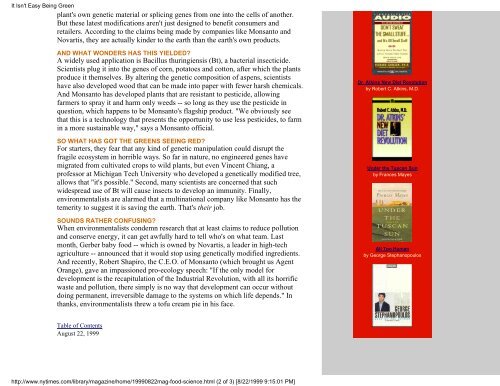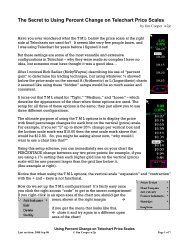The New York Times Magazine, Sunday, August 22 - Unauthorized ...
The New York Times Magazine, Sunday, August 22 - Unauthorized ...
The New York Times Magazine, Sunday, August 22 - Unauthorized ...
You also want an ePaper? Increase the reach of your titles
YUMPU automatically turns print PDFs into web optimized ePapers that Google loves.
It Isn't Easy Being Green<br />
plant's own genetic material or splicing genes from one into the cells of another.<br />
But these latest modifications aren't just designed to benefit consumers and<br />
retailers. According to the claims being made by companies like Monsanto and<br />
Novartis, they are actually kinder to the earth than the earth's own products.<br />
AND WHAT WONDERS HAS THIS YIELDED?<br />
A widely used application is Bacillus thuringiensis (Bt), a bacterial insecticide.<br />
Scientists plug it into the genes of corn, potatoes and cotton, after which the plants<br />
produce it themselves. By altering the genetic composition of aspens, scientists<br />
have also developed wood that can be made into paper with fewer harsh chemicals.<br />
And Monsanto has developed plants that are resistant to pesticide, allowing<br />
farmers to spray it and harm only weeds -- so long as they use the pesticide in<br />
question, which happens to be Monsanto's flagship product. "We obviously see<br />
that this is a technology that presents the opportunity to use less pesticides, to farm<br />
in a more sustainable way," says a Monsanto official.<br />
SO WHAT HAS GOT THE GREENS SEEING RED?<br />
For starters, they fear that any kind of genetic manipulation could disrupt the<br />
fragile ecosystem in horrible ways. So far in nature, no engineered genes have<br />
migrated from cultivated crops to wild plants, but even Vincent Chiang, a<br />
professor at Michigan Tech University who developed a genetically modified tree,<br />
allows that "it's possible." Second, many scientists are concerned that such<br />
widespread use of Bt will cause insects to develop an immunity. Finally,<br />
environmentalists are alarmed that a multinational company like Monsanto has the<br />
temerity to suggest it is saving the earth. That's their job.<br />
SOUNDS RATHER CONFUSING?<br />
When environmentalists condemn research that at least claims to reduce pollution<br />
and conserve energy, it can get awfully hard to tell who's on what team. Last<br />
month, Gerber baby food -- which is owned by Novartis, a leader in high-tech<br />
agriculture -- announced that it would stop using genetically modified ingredients.<br />
And recently, Robert Shapiro, the C.E.O. of Monsanto (which brought us Agent<br />
Orange), gave an impassioned pro-ecology speech: "If the only model for<br />
development is the recapitulation of the Industrial Revolution, with all its horrific<br />
waste and pollution, there simply is no way that development can occur without<br />
doing permanent, irreversible damage to the systems on which life depends." In<br />
thanks, environmentalists threw a tofu cream pie in his face.<br />
Table of Contents<br />
<strong>August</strong> <strong>22</strong>, 1999<br />
http://www.nytimes.com/library/magazine/home/199908<strong>22</strong>mag-food-science.html (2 of 3) [8/<strong>22</strong>/1999 9:15:01 PM]<br />
Dr. Atkins <strong>New</strong> Diet Revolution<br />
by Robert C. Atkins, M.D.<br />
Under the Tuscan Sun<br />
by Frances Mayes<br />
All Too Human<br />
by George Stephanopoulos






